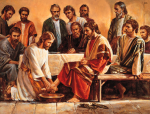 Bringing good news
Bringing good news
What was Jesus called to do on earth? According to the Kingdom mandate of Is 61:1-3 (ie his job description), which he ‘owned’ in Lk 4:17-21, he was called
• To preach good news to the poor (we all are)
• To proclaim release to the captives
• To heal
• To free the down-trodden
• To proclaim the year of favour i.e. to bring justice by releasing people from bondage
How was he to do this? As a servant. People thought Messiah would come as a King or General but God the Father had other ideas (see Is 42:1-4): ‘Behold my servant…’. God put His Spirit on Jesus
• To bring forth justice
• To support a bruised reed
• To fan a smouldering wick
Did he do this? The answer is a resounding ‘yes’! In Jn 17:4 we read that, during one of the final times he prayed to the Father he was able to say with confidence ‘I have brought you glory on earth by completing the work you gave me to do’. Then, on the cross, he was able to declare ‘It is finished!’, a shout of victory (Jn 19:30).
Will you be able to say that when you come to the end of your life? Will you have accomplished the purposes for which God chose you?
As the Body of Christ we are all called to be servants, whether we are church leaders or the newest member.
How do we emulate Jesus?
Servanthood is not an option. In Matt 20:25-28 we read that whoever wants to be great must be a servant and whoever wants to be first must be a slave. ‘The Son of Man did not come to be served but to serve’ (Matt 20:28).
Many years ago I visited a church in Sheffield. Behind the preacher was a wall hanging on which was written ‘Saved to Serve’. This provided a constant reminder to the people that they have been saved for purpose, not just to assure them of eternal life. We were created ‘for good works … that we should walk in them’ (Eph 2:10).
Jesus – our example
Last year we had a big royal wedding in UK when Prince William, the Queen’s grandson, married Kate Middleton. It received worldwide coverage on television and had some of the largest viewing figures ever recorded (3bn). Where did they go for their honeymoon? Dharavi, the largest slum in Asia, situated in Mumbai in India? What a ridiculous suggestion! They in fact went to the beautiful Seychelles.
But is that suggestion so ridiculous? In Phil 2:6 Paul tells us that Jesus ‘did not count equality with God a thing to be grasped but emptied himself, taking the form of a bond servant, and being made in the likeness of men.’ The difference between His rightful place at the right hand of the Father and walking this earth as a servant is infinitely greater than the social gap between British royalty and the slum-dwellers of Mumbai. But this passage about Jesus ‘emptying himself’ is preceded by an exhortation that we should have the same attitude as Jesus. Are we prepared to do that? Servanthood provides the opportunity.
Attitude
What was Jesus’ attitude?
• It was one that caused him to wash the disciples feet (Jn 13:5).
• It was one where he had no rights since he emptied himself and chose to set aside his equality with God (Phil 2:6,7).
• It was one where he was ‘under orders’ – indeed, those words almost define what a bond servant is. He only did what the father told him (Jn 12:49, 50). A servant is there for his master.
How does this correspond with your attitude? What is your attitude to serving? Attitude reveals much about our character. Is your attitude like Jesus’?
Next time we will look at some of the characteristics of servanthood through the example of Joseph.

